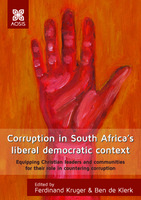Corruption in South Africa's liberal democratic context
Equipping Christian leaders and communities for their role in countering corruption
Author(s)
Kruger, Ferdi
Klerk de, B.J.
Language
EnglishAbstract
This book is meant for academics in the fields of theology and ecclesial management, for business leaders and governmental authorities in the private and public domain. This collected work by mainly practical theologians reflects on the phenomenon of corruption in the liberal democracy of post-apartheid South Africa. Liberal democracy has considerable salience in the contemporary world. Not only is it the form that many of the world’s most powerful and influential nations approve of, but it is a political system that is being tried – and used – by many formerly developing countries. South Africa is described as predominantly Christian. In such a context corruption is not to be expected. However, it is strongly prevalent. It undermines the values of both democracy and Christianity. Not only does corruption promote a general lack of trust in institutions and leadership, but it stimulates a perpetual culture of corruption that invades all spheres of life. The research is based on a qualitative empirical study. Its aim is to stimulate discourse in theology and related disciplines. Data were collected by means of interviews with political, business, church, and labour union managers and leaders in South Africa’s Gauteng area, who have experienced corruption. This area is the hub of economic, executive political and public office activities in South Africa. Respondents were specifically asked how their experience of corruption was informed by their norms, which in turn were influenced by their religious convictions and cultural conventions. The book suggests strategies for redressing the current ‘culture of corruption’. Although the chapters represent different perspectives, the shared objective is to emphasise that corruption is unethical, to describe and explain why it is taking place and how the situation should appear. The explanation focuses on the negative consequence of corruption: it does not respect human dignity – the ‘otherness’ of others; it exacerbates poverty; it weakens religious values and norms; it is not conducive to social cohesion in the country. The authors also share the theological premise that God is present in this world. In the kingdom of God, believers are encouraged to participate in the ‘clean-up’ process which includes combating the phenomenon of corruption. This book roots theological research and reflection in the real life of both believers and non-believers who consider a ‘clean’ world without corruption as an absolute necessity for a country characterised by the ideals of liberal democracy. The book will stimulate on-going transdisciplinary research focusing on unethical lifestyles, and it will also encourage church leaders to engage with managers in other spheres of society, such as politics and economics in order to counter the evil of corrupt practices. The research outcomes are relevant not only in the South African context, but also globally.
Keywords
corruption; democratic context; christian leaders; countering corruption; pastoral directives; Ezekiel; God; Jesus; South AfricaDOI
10.4102/aosis.2016.csaldc05ISBN
9780620725262OCN
982239372Publisher
AOSISPublisher website
https://books.aosis.co.za/index.php/obPublication date and place
Durbanville, 2016Imprint
AOSISClassification
Christian life and practice


 Download
Download Web Shop
Web Shop